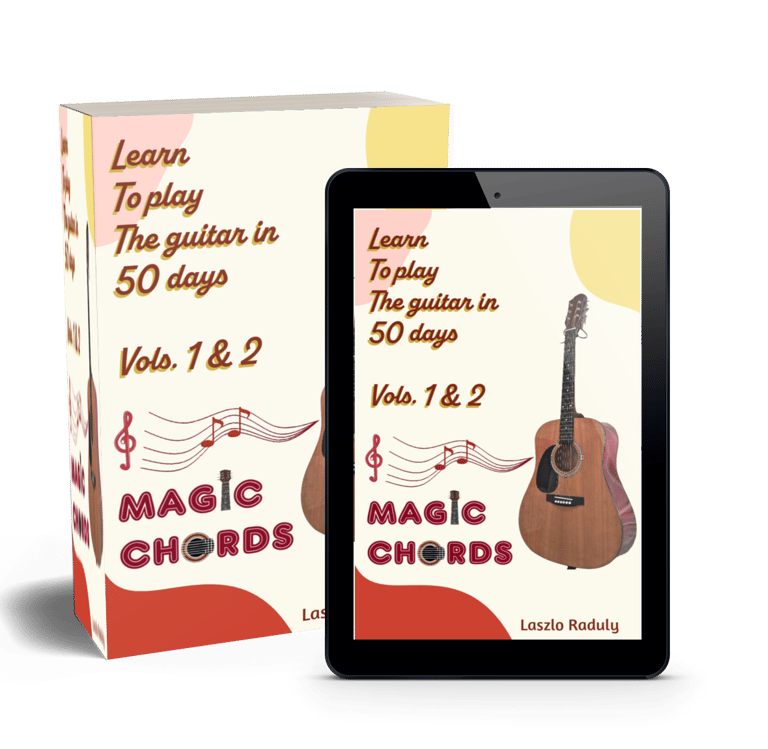
Easy Guitar Exercises: Simple Guitar Lessons for Beginners
Discover simple guitar lessons for beginners with easy guitar exercises, daily practice routines, and step-by-step tutorials to boost your confidence quickly.
magicchords.com
7/10/2025


Simple Guitar Lessons for Beginners
Embarking on the journey of learning to play the guitar can be both exciting and overwhelming. Simple guitar lessons for beginners are essential, as they lay the groundwork for developing fundamental skills. It is crucial for novices to grasp basic techniques, such as proper hand positioning, tuning the guitar, and basic strumming patterns. By focusing on these foundational elements, beginners can ensure their progress remains steady and enjoyable.
There are various types of lessons tailored specifically for those new to the instrument. Online tutorials have gained popularity due to their accessibility and flexibility. They provide a wealth of resources, ranging from video demonstrations to interactive lesson plans. This mode of learning allows beginners to practice at their own pace, replaying sections that challenge them until they gain confidence. Additionally, many online platforms offer comprehensive courses that systematically advance from beginner to more complex techniques.
In-person classes are another valuable option for simple guitar lessons. These sessions offer direct interaction with an experienced instructor, providing immediate feedback that is crucial for skill development. Instructors can tailor lessons to address individual needs, making adjustments in real-time to help students overcome specific challenges. Moreover, the motivation from a teacher can greatly enhance the learning experience, fostering a supportive environment for practice.
As beginners approach their first lessons, it is important to maintain a positive mindset. Simple guitar lessons can introduce the joy of music without overwhelming new players. Learners should expect to gradually progress through easier chords and melodies, gaining confidence as they develop their skills. Ultimately, the key to a successful start with guitar lies in patience, practice, and persistence. By embracing this journey, beginner guitarists will soon find themselves more comfortable and motivated to continue learning.
Easy Guitar Practice Routines
Establishing effective and easy guitar practice routines is crucial for beginners. These routines not only provide structure but also contribute significantly to skill development over time. Consistency in practice is vital; it is during these repeated sessions that muscle memory becomes ingrained. Beginners should aim for short, focused practice sessions that fit comfortably into their daily schedules, allowing for gradual progress without overwhelming frustration.
A recommended practice routine should typically start with a warm-up session. Simple finger exercises focusing on finger strength and agility can enhance dexterity and coordination. For example, playing chromatic scales across all strings is an excellent way to heat up the fingers and improve overall finger positioning.
Following the warm-up, practicing chord changes is essential. Beginners often struggle with transitioning between chords smoothly. As such, dedicating 10 minutes to focus solely on changing from one chord to another can yield significant improvements. Using common chords like G, C, D, and E minor, beginners can practice cycling through these chords in a repetitive manner to build confidence and ease.
Moreover, integrating strumming patterns enhances rhythm and timing. A practical approach is to start with simple downstrokes and gradually incorporate more complex patterns as proficiency develops. Consider spending around 10 minutes on strumming patterns, and use a metronome to maintain a steady tempo. This can help students increase their proficiency effectively and add a musical component to their practice.
Finally, it is essential to tailor routines to fit individual schedules. While some may have longer blocks of time to practice, others may only have short segments available throughout the day. Adapting practice routines to personal preferences and learning paces ensures that every practice session remains productive and engaging, fostering a long-term commitment to learning guitar.
Beginner Guitar Lesson Plan
For beginners embarking on the journey of learning the guitar, having a structured lesson plan can significantly enhance the learning experience. This lesson plan is designed to span a four-week period, allowing beginners to build their skills incrementally and systematically. Each week will focus on critical areas essential for developing a strong foundation in guitar playing.
In week one, new learners should focus on familiarizing themselves with the guitar's anatomy and how to hold the instrument correctly. Basic exercises should include learning the names of the strings and practicing open string plucking. After securing this foundation, beginners can then move on to learning essential chords. Chord progression exercises involving common open chords, such as G, C, D, and E minor, will enhance finger dexterity and provide a starting point for playing songs.
By week two, learners can start incorporating basic strumming patterns into their practice sessions. Strumming is a vital skill that adds rhythm to playing and can drastically improve a beginner's ability to accompany songs. Practicing simple downstrokes and alternating between down-up strumming patterns will help solidify this technique. During this week, learners should also apply these strumming patterns to the chords learned in week one, enhancing their musicality and experience.
In the third week, students should begin learning their first simple songs. Selecting songs that utilize the previously learned chords will reinforce skills while keeping motivation high. As the learner practices these songs, they should pay attention to transitioning smoothly between chords and maintaining consistent strumming. This week encourages creativity; learners can experiment with different strumming styles to enhance their understanding.
Finally, week four should focus on reinforcing all skills acquired in the previous weeks while introducing new ones, such as fingerpicking or basic scales. A reflective review of progress should also take place, prompting learners to assess their achievements and areas needing improvement. This structured four-week lesson plan serves as a valuable roadmap for beginners, facilitating a comprehensive and rewarding learning experience in their guitar-playing journey.
Basic Guitar Exercises Daily
For beginners embarking on their guitar journey, establishing a routine of basic guitar exercises is essential. These exercises not only enhance playing skills but also build the necessary dexterity and muscle memory vital for progression. Every aspiring guitarist should focus on three crucial areas: finger exercises, scales, and chord transitions.
Finger exercises serve as a foundational element for developing strength and agility in your fingers. A common practice is to perform chromatic scales, which involve playing all four fingers in succession across the fretboard. Start with a simple sequence on the lowest string, progressively moving up and down, and ensure accuracy over speed initially. As you grow more comfortable, increase the tempo to challenge your coordination further.
Incorporating scale practices into your daily routine helps familiarize you with various musical frameworks. The major and minor scales are indispensable, as they form the basis for a multitude of songs. By mastering these scales, you can improve your improvisational skills and overall musical understanding. Allocate specific time during each practice session to focus solely on scales, aiming for clarity and precision over speed. This will enhance both your technical ability and musicality.
Chord transitions are another area beginners must prioritize. The ability to switch seamlessly between chords is vital for playing songs effectively. Start by choosing two or three basic chords, such as G, C, and D, and practice moving between them. Focus on minimizing the time taken to change between chords, and employ a metronome to keep a steady rhythm. As your proficiency improves, introduce more complex chords into your practice.
To integrate these exercises into your daily practice, set specific goals for each session. For instance, allocate ten minutes for finger exercises, followed by fifteen minutes on scales, and conclude with chord transition practice. Overcoming common challenges, such as finger fatigue or difficulty with coordination, can be addressed by maintaining a consistent schedule and gradually increasing the complexity of the exercises.
Guitar Tutorial for Absolute Beginners
Starting your journey with the guitar can be both exciting and daunting, especially for absolute beginners. This guitar tutorial aims to provide a solid foundation by breaking down fundamental concepts into easy-to-follow steps. Understanding how to properly hold your guitar is essential. Sit comfortably with the guitar resting on your right leg if you're right-handed, or your left leg if you're left-handed. Ensure that the body of the guitar is secure against your torso, and position your left hand on the neck.
Next, tuning your guitar is a critical first step. An out-of-tune instrument can result in frustration and hinder your learning process. Use an electronic tuner or a tuning app to ensure each string is at the correct pitch (E, A, D, G, B, e from the thickest to the thinnest string). As you progress, learning how to tune by ear will further enhance your musical skills.
Once your guitar is tuned, you can experiment with your first chords. Start with essential chords like E minor, C major, and G major. These chords form the basis for many songs and will serve as a stepping stone for your guitar playing. Practice transitioning between these chords slowly, focusing on finger positioning and strumming rhythm. A methodical approach, such as the 'one minute of each chord' technique, can greatly improve speed and accuracy.
For additional resources, consider online platforms like YouTube or dedicated guitar learning websites. Many offer structured courses tailored for beginners, which can greatly complement the information in this tutorial. Remember, patience is key; your skills will develop over time with consistent practice. As you continue through this tutorial, you will find yourself building a solid foundation for your guitar journey.
Tips for Staying Motivated as a Beginner
Learning to play the guitar can be a rewarding experience, but it often comes with its challenges. Staying motivated is crucial for beginners to ensure progress and maintain enthusiasm for practice. One effective strategy is to set achievable goals. Breaking down larger objectives into smaller, manageable tasks can foster a sense of accomplishment. For instance, instead of aiming to play an entire song, focus first on mastering a single chord or a short segment. This approach allows for quick wins, which can boost confidence and drive further practice.
Celebrating small milestones is equally important in maintaining motivation. Recognizing and rewarding oneself for reaching specific goals, no matter how minor, helps create a positive reinforcement loop. This could be as simple as treating oneself to a favorite snack after a productive practice session or sharing progress with friends or family. The acknowledgment of progress, even if it does not meet the overall target, can play a significant role in sustaining enthusiasm.
Additionally, finding a supportive community can enhance motivation significantly. Engaging with fellow learners or joining online forums can provide encouragement and accountability. Connecting with others who share similar goals makes the learning experience more enjoyable and can introduce new perspectives or techniques that may enrich one’s skill set. Furthermore, keeping practice sessions engaging is vital. This can be achieved by incorporating diverse styles of music, experimenting with different techniques, or setting up themed practice days. Ensuring that practice remains enjoyable contributes to long-term commitment to learning the guitar.
In conclusion, integrating these strategies can help beginner guitarists stay motivated on their musical journey. By setting achievable goals, celebrating small wins, engaging with a supportive community, and keeping practice enjoyable, learners can successfully navigate the early stages of guitar playing without losing momentum.
Resources for New Guitarists
For those embarking on their journey in learning the guitar, a wealth of resources exists to enhance skills and provide guidance. Numerous websites dedicate themselves to guitar education, offering lessons and instructional materials tailored specifically for beginners. One such prominent site is JustinGuitar, renowned for its comprehensive video lessons that cover everything from basic chord progressions to advanced techniques. Similarly, Guitar Tricks provides an extensive library of tutorials that can cater to varying levels, ensuring that beginners have the foundation to build upon.
In addition to websites, various mobile applications can significantly aid new guitarists. Apps like Ultimate Guitar and Fender Play not only offer chord charts and tabs but also provide interactive lessons for effective learning. These applications present an engaging way to practice on-the-go and can bolster one's understanding of music theory and song structure.
Books remain a timeless resource for new guitarists seeking structured learning. Titles such as "Guitar for Dummies" offer an excellent introduction, while "The Complete Guitar Handbook" provides deeper insights into playing techniques and music theory. Both publications serve as crucial companions to online learning platforms and tutorials.
Communities and forums online form essential support networks for beginner guitarists. Platforms like Reddit's Guitar community and the Uberchord Community allow users to ask questions, share experiences, and find motivation among fellow learners. These forums can be invaluable for novices seeking assistance or simply wishing to connect with others on the same journey.
As you delve into the world of music, these resources can empower you to enhance your guitar-playing skills. By utilizing a combination of online materials, applications, books, and community engagement, beginners can forge a path toward becoming proficient guitarists while enjoying the process of learning.
Starting your guitar journey can feel overwhelming, but with the right guidance and structure, it becomes a fun and rewarding experience. In this post, we’ll explore easy guitar exercises and simple guitar lessons for beginners that will help you build a strong foundation from day one. Whether you’ve just picked up a guitar or want to improve your basic skills, these tips are designed to get you playing with confidence.
A good beginner guitar lesson plan focuses on repetition, comfort, and small wins. With consistent practice using basic guitar exercises daily, your fingers will get stronger, your coordination will improve, and chord transitions will become smoother. These easy guitar practice routines include finger exercises, chord changes, strumming drills, and simple melodies that are both fun and practical.
We’ll also walk you through a guitar tutorial for absolute beginners, breaking down each step so you can progress at your own pace. No prior knowledge is needed — just grab your guitar and follow along. With just a few minutes of focused effort every day, you’ll be amazed how quickly your playing improves.
Ready to start? Let’s dive into the most effective and easy-to-follow exercises for beginners that will make your guitar journey enjoyable and successful.


TIP FOR BEGINNERS: Changing guitar strings might seem tricky at first, but with the right steps, it becomes simple and satisfying. In our guide on how to change guitar strings, you'll learn the easiest way to keep your guitar sounding fresh and clear.
Learning guitar chords for beginners is the perfect first step to start playing songs with ease. Our guide breaks down the basics, helping new players understand finger placement, common chords, and simple transitions to build a solid musical foundation quickly.




